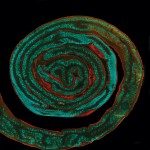Lien vers Pubmed [PMID] – 29423082
Oncotarget 2018 Jan;9(3):3779-3793
The Fanconi anemia (FA) pathway is implicated in the repair of DNA interstrand crosslinks (ICL). In this process, it has been shown that FA factors regulate the choice for DNA double strand break repair towards homologous recombination (HR). As this mechanism is impaired in FA deficient cells exposed to crosslinking agents, an inappropriate usage of non-homologous end joining (NHEJ) leads to the accumulation of toxic chromosomal abnormalities. We studied a family with two FANCG patients and found a genetically inherited attenuation of mitomycin C sensitivity resulting in an attenuated phenotype for one patient or in increased resistance for two healthy relatives. A heterozygous mutation in ATM was identified in these 3 subjects but was not directly linked to the observed phenotype. However, the attenuation of ICL sensitivity was associated with a reduced recruitment of 53BP1 during the course of ICL repair, and increased HR levels. These results further demonstrate the importance of favoring HR over NHEJ for the survival of cells challenged with ICLs.

